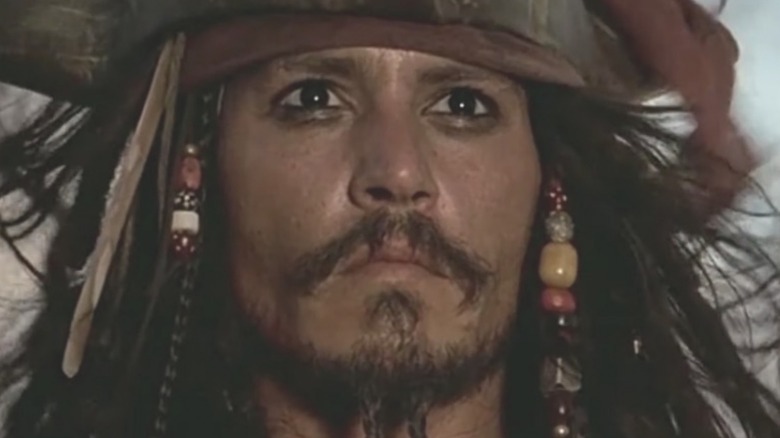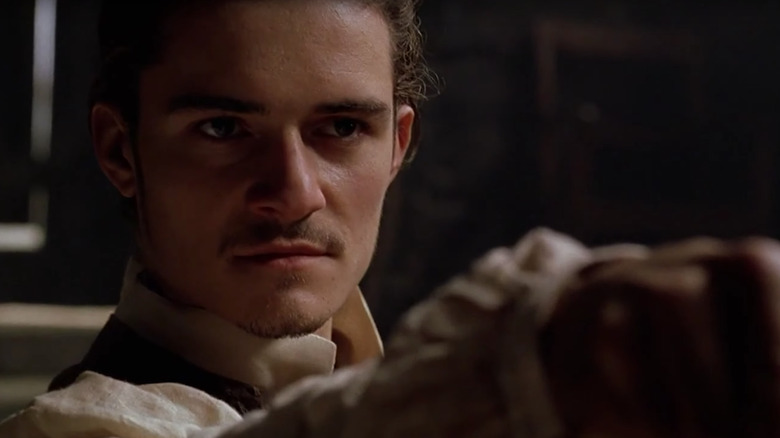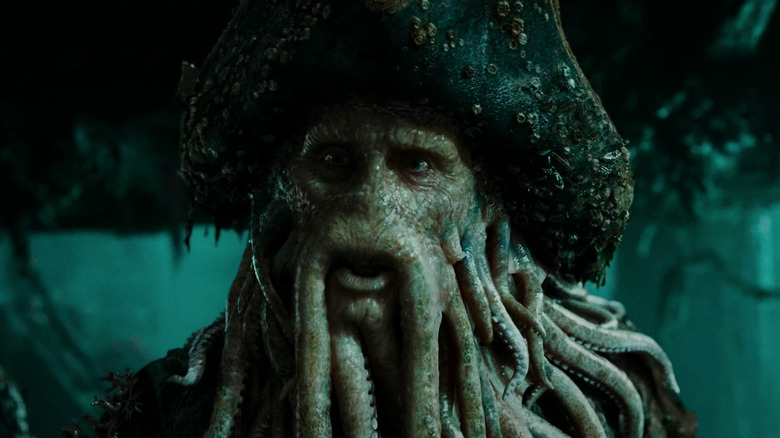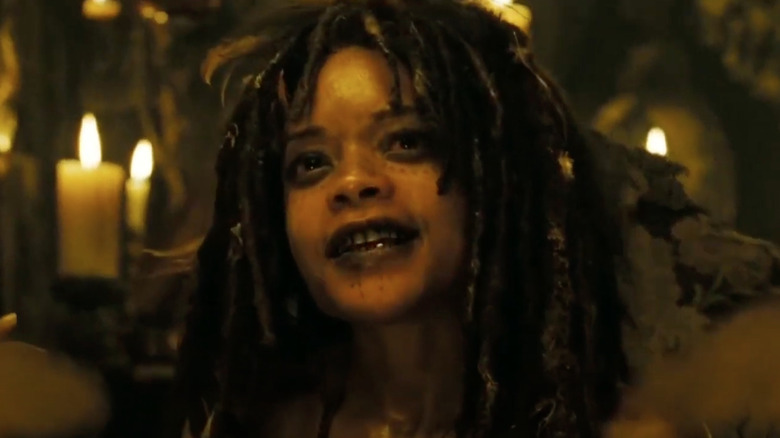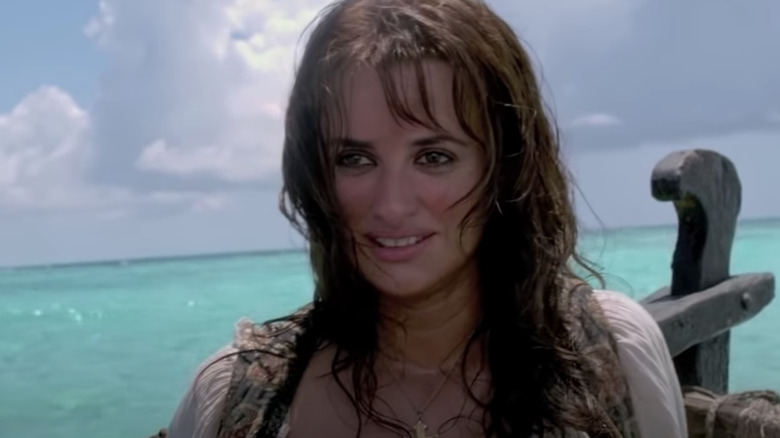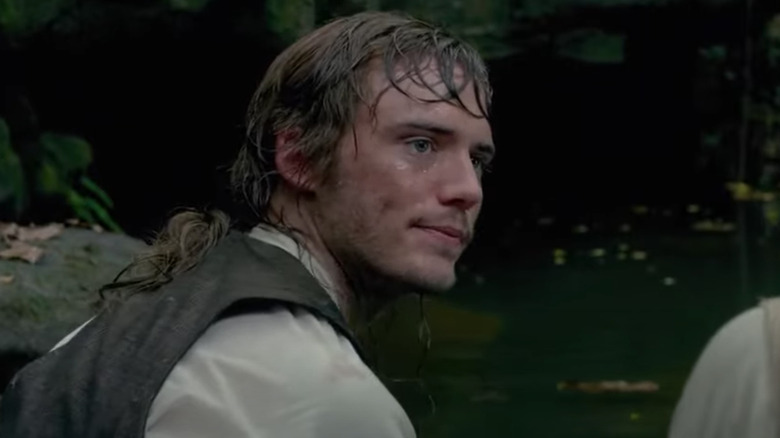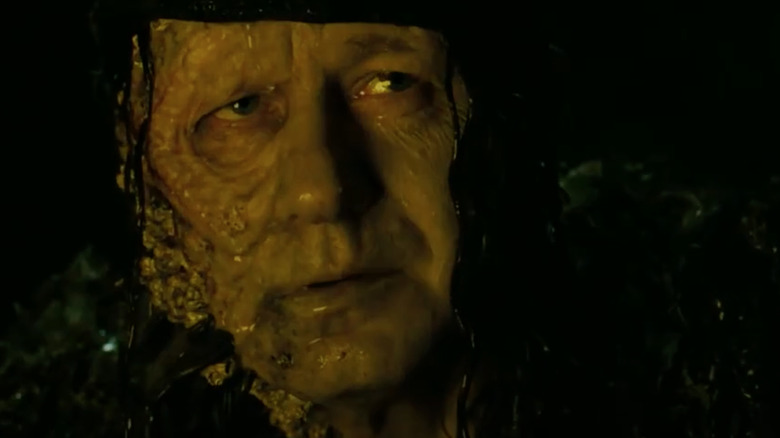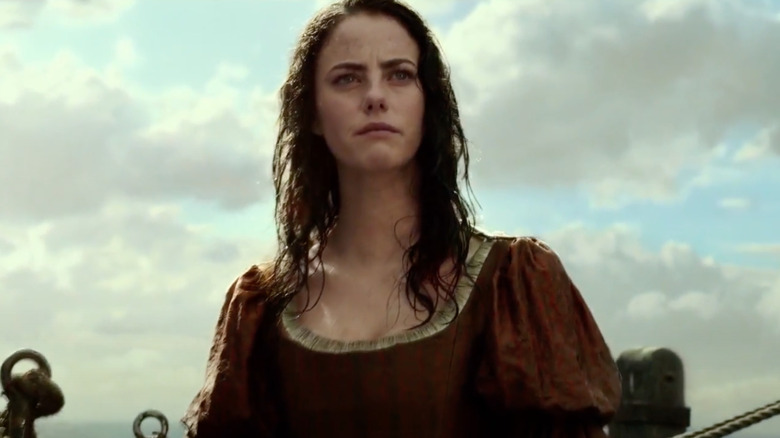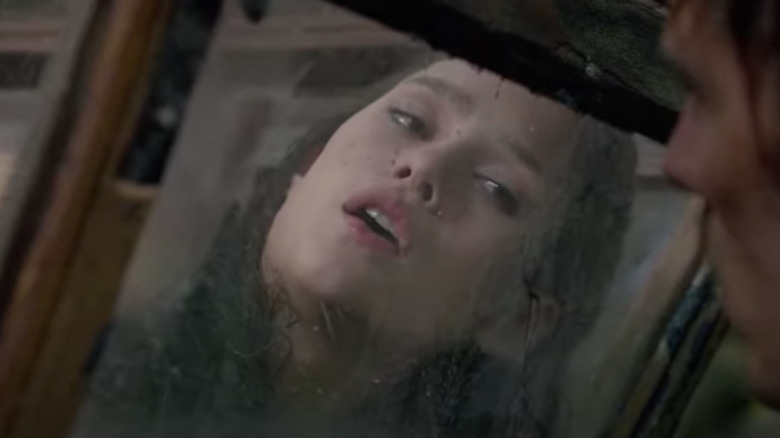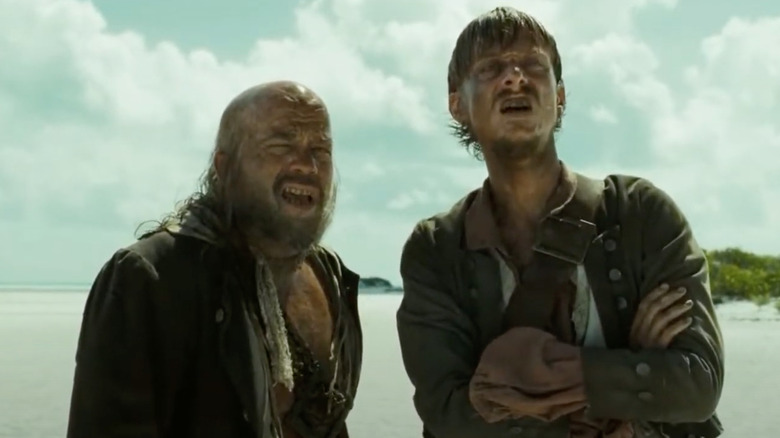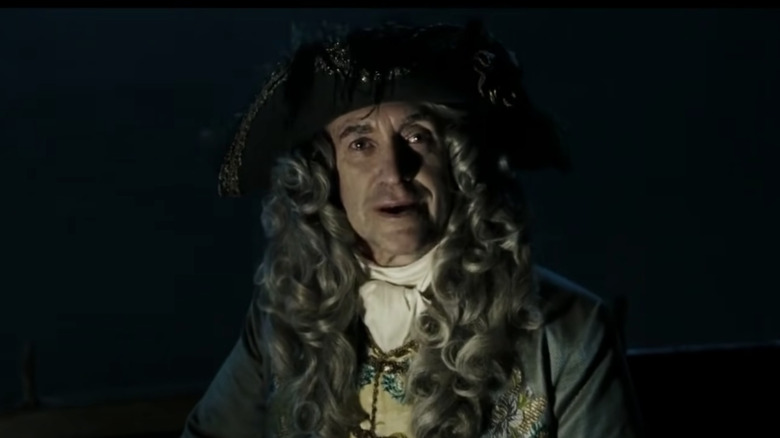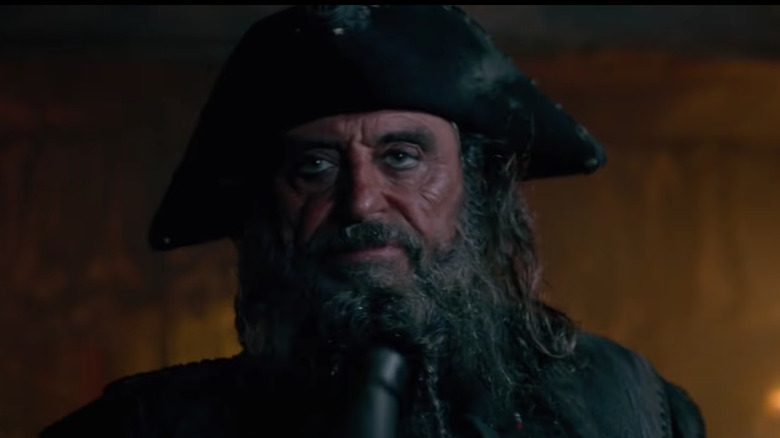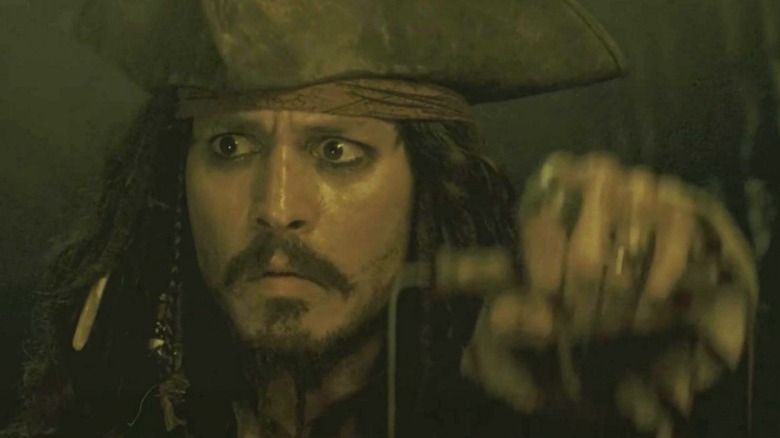Lovable Pirates Of The Caribbean Characters We Wound Up Hating By Series End
"Pirates of the Caribbean" remains one of the most beloved franchises of all time. Spanning five films that collectively grossed over $4 billion at the worldwide box office, the tales of Jack Sparrow delighted audiences for over a decade thanks to their action-driven spectacle, winning performances and light-hearted tone. The series turned Johnny Depp, Orlando Bloom and Keira Knightley into megastars, pushed the boundaries of special effects, heralded a memorable Hans Zimmer score and established a new brand of darker filmmaking for Walt Disney Studios, working in collaboration with legendary producer Jerry Bruckheimer ("The Rock," "Crimson Tide," "Top Gun").
Even so, over the course of five films, the fun slowly began to give way to redundancy for most. Plots became increasingly convoluted and the writers' carelessness in regards to continuity undermined the legitimacy of the franchise, even among faithful fans who stuck with the series until the bitter end.
Naturally, beloved characters, even the likes of Jack Sparrow and Will Turner, ultimately grew tiresome, leaving critics and audiences pining for the simpler days of the original film, "Pirates of the Caribbean: The Curse of the Black Pearl." You're probably asking which beloved characters made us grind our teeth by the end of the franchise, and you're in luck, as we've compiled a list answering that very question.
Will Turner
Will Turner is introduced as the perennial underdog, a middle class servant who spends his days pining for Elizabeth Swann when he's not brushing up on his swordplay. We admired his bland nobility and intelligence, and appreciated the determination he demonstrates at protecting his friends and family. At the end of "The Curse of the Black Pearl," when he literally transforms into a Musketeer — replete with a hat adorned with an oversized feather — audiences cheer at his victory and applaud his eventual romance with Elizabeth.
Two films later, Will somehow morphs into a dull cardboard cutout without much in the way of character development aside from a dog-like obedience to Elizabeth. He makes rash decisions that negatively affect others, and too often gets swindled into bad situations by those around him. He barely figures into the plot of "At World's End" until the finale, when the writers decide to bind him to Davy Jones' ship for all eternity during the head-scratching climax. If that wasn't enough, when next we see him in "Dead Men Tell No Tales," he's still just the same ol' Will — although inexplicably covered in barnacles. The man simply doesn't change despite taking part in some truly awesome adventures, a trait that makes the character more irritating than endearing.
Davy Jones
Yeah, we know, Davy Jones is a bad guy. Perhaps the most formidable to emerge from the "Pirates" saga. Yet, when the one-legged fish-man first appeared in "Dead Man's Chest," we found him oddly likable, mostly thanks to Bill Nighy's colorful and pitch-perfect performance. He may snarl and spit and look like something you'd find in a Long John Silver's, but damn it all if he wasn't an enjoyable onscreen presence who commanded every scene he took part in. What's more, his tragic backstory made one sympathetic towards his current plight, as it was his love for the goddess Calypso that turned him into an evil demon in the first place.
With a little more effort, Jones could have easily become one of the all-time great cinematic villains. Alas, for whatever reason, "At World's End" sees Jones revert to a one-dimensional bad guy role, replete with a mano a mano sword fight between him and Jack Sparrow that sadly lacks any sort of complexity. Audiences are never on Jones' side and when the seaweed-covered baddie takes one last stab at securing the "Worst Character Imaginable" award by literally stabbing Will in the heart, it's all we can do to wish someone would send this foul beast into the abyss.
Tia Dalma
"Dead Man's Chest" also introduces the mysterious Tia Dalma, a character who lives "up river" where she performs magic and occasionally raises people from the dead. As played by Naomie Harris, Tia is playful, fun and sexy. Her flirtatious dialogue with Jack carries a certain edge and hints at a grander relationship, while her mysterious abilities raise plenty of questions about her true nature.
As it turns out, Tia Dalma is actually the goddess Calypso in human form, bound to the flesh by her former lover Davy Jones and the pirate Brethren Court. You'd think such an intriguing subplot would lead to a powerful, even complex love story. After all, Tia Dalma more or less created Davy Jones after their brief love affair left the former pirate embittered enough to cut out his own heart. What's her excuse for tossing Jones aside in such a cruel manner? Power? The love of another like, say, Jack Sparrow? Some sort of heartbreaking betrayal? Nope. "It's just my nature," she tells Jones nonchalantly.
Well, that's certainly anticlimactic, enough so that by the time the witch-goddess-sea demon grows into a giant and explodes into a billion tiny CGI crabs during the climax of "At World's End," we can hardly muster a shrug. After all, if the writers don't care about Tia Dalma or Davy Jones, why should we?
Angelica
"On Stranger Tides" took steps to add a little spice to the proceedings by introducing Angelica, Jack Sparrow's former friend and lover. Early on, the pair conjure up some playful banter that hints at their former relationship, but eventually the convoluted storyline takes over and Angelica is reduced to a plot device whose role constantly changes based on the necessities of the scene.
Case in point: at the beginning of the film, Angelica asserts that she's only pretending to be Blackbeard's daughter in order to find the fabled Fountain of Youth. At the climax, however, she reveals that she is indeed the daughter of Blackbeard for ... reasons that aren't entirely clear. Why the masquerade? Because the film needed a twist. That's the only explanation we can think of, because the revelation adds nothing to the narrative and actually cheapens Angelica's character by making her far less clever than originally believed.
If that wasn't enough, she's actually angry at Jack when he tricks her father into saving her life by giving up his, a result of the confusing Fountain of Youth machinations. "You are cruel and ignorant," she tells Jack. Come again?
Jack decides he can't trust (or stand) Angelica and leaves her stranded on a desert island with nothing but a gun and a single bullet. We would too, Jack. We would too.
Philip
After Will and Elizabeth exited stage right at the conclusion of "At World's End," the "Pirates" franchise scrambled to find a replacement couple to fill the void left by the two beloved lead characters. Enter Philip, a missionary quite literally stuck aboard Blackbeard's ship — he's tied to the mast, you see? — on account of Angelica, the ship's first mate, refusing to kill him. As played by the ever-charismatic Sam Claflin, who would go on to memorably play Finnick Odair in "The Hunger Games: Catching Fire," the character emerges as a unique creation, a deeply religious young man with more ideals than any of his pirate counterparts. In one memorable scene, he begs Blackbeard to spare the life of an escaping crewmate to no avail.
From here, one might expect an interesting subplot wherein Philip questions and/or struggles with his personal beliefs and arrives at some sort of novel conclusion about God at the end of his storyline — particularly since the film revolves around immortality and features magical objects such as the Sword of Triton. If Greek gods exist, what does that say about Philip's religious ideology?
No dice. Instead, the writers posit Philip in a tedious, half-hearted love story with Syrena, the mermaid, that ends on a rather anticlimactic and confusing note: she carries him away into the depths of the sea after he asks for forgiveness. Huh?
Philip ranks among the dreariest characters introduced in the "Pirates" saga, which is saying something.
Bootstrap Bill Turner
"Bootstrap" Bill Turner (Stellan Skarsgård) stole our hearts simply by virtue of being Will's father. Not to mention that he was the only one of Jack's crew to stand up for him during the whole Black Pearl mutiny thing all those years ago. As such, we ultimately applaud Will's efforts to free his father from Davy Jones' ship and even feel sorry for the barnacle-covered chap when he next appears in a prison cell, his body slowly merging with the Flying Dutchman. At this point, Bootstrap has gone and lost his damned mind, which results in the death of the beloved James Norrington and, ironically enough, his own son during the climax of "At World's End."
Luckily, Jack amends the situation by having Will stab Davy Jones' heart, but the decision leaves the poor bloke bound to the Flying Dutchmen for eternity. All because his father couldn't keep it together for a few more weeks/months. Ultimately, Will's noble quest to save his old man proves fruitless and leaves us wishing he had just run off with Elizabeth when he had the chance, because "Bootstrap" Bill was so not worth the hassle.
Carina Smyth
Carina Smyth (Kaya Scodelario) doesn't appear in the franchise until the fifth and final film, "Dead Men Tell No Tales," and early on it feels as though she might compete with Elizabeth Swann for the role of Best Female Pirate Character thanks to her quick wit, cunning ability to get out of sticky situations and overall ability to handle herself. Yet once it's revealed that she's Hector Barbossa's (Geoffrey Rush) daughter, literally everything about Carina capsizes. Essentially, she's not really a character, but a flimsy plot device designed to help our heroes traverse a convoluted storyline to reach the Trident of Poseidon, a magical device possessing the ability to reboot franchises.
If that weren't enough, her conception makes zero sense within the established "Pirates" lore: in "Dead Men Tell No Tales," it's revealed that Hector met Carina's mother when he and Jack were still best mates on the Black Pearl. Except, in "Curse of the Black Pearl," we learn that Hector stole the ship from Jack 10 years prior, which would have been 30 years before the events of the final film. Yet, Carina is only 20 years old when we meet her, meaning she was conceived far later than the film suggests. The filmmakers behind the "Pirates" franchise obviously stopped caring about consistency long ago, but this particular plot hole is simply too glaring to ignore. It makes the far-too-perfect Carina more cumbersome than charming.
Syrena
We've seen a number of mermaids on the big screen in various formats, but Syrena (Àstrid Bergès-Frisbey) has to rank among the worst of the bunch. Introduced in "On Stranger Tides," we initially found her and her kind fascinating. Evil, cannibal mermaids? That's something you don't see everyday. After said intro, however, the character doesn't amount to much of anything and mostly sticks around because the plot requires mermaid tears, or something.
The writers do attempt to spin a love story around Syrena and clergyman Philip, but the pair of characters induce more groans than swoons and — as insane as it may sound — manage to make Will and Elizabeth's romance look like Rick and Ilsa's from "Casablanca" by comparison.
Also, it certainly doesn't help that Syrena is fooled far too easily into producing tears for Blackbeard's company, who pretend to kill Philip in the hopes of making the young fish woman sad. The plot "twist" is predictable enough to cause us to roll our eyes and dumb enough to make us wish this particular fish had been tossed back to the sea.
Pintel and Ragetti
The "Pirates" franchise boasted any number of comic relief characters, but Pintel and Ragetti (Lee Arenberg and Mackenzie Crook) managed to stand out in "Curse of the Black Pearl" thanks to their mischievous nature and genuinely hilarious banter. Whether stuck in a rowboat adorned in dresses or attempting to decipher the meaning of "parley," the dimwitted pair made a formidable odd couple that positively impact the story. Intriguingly, neither are considered good guys in "Curse of the Black Pearl." It's they who capture Elizabeth Swann for Barbossa, setting the plot in motion, and the duo also commit a bevy of violent murders in their relatively brief screen time — enough, at least, to welcome their surrender at film's end.
In the subsequent sequels, the writers see fit to make the pair goofier and even kind, to the point where they no longer pose much threat to anyone on screen. At the climax of "Dead Man's Chest," they save Elizabeth's life by chopping one of the Kraken's tentacles and even tearfully bid adieu to her in "At World's End," which doesn't jibe with their early personalities. Pintel and Ragetti are often alongside the principal characters far too often despite contributing absolutely nothing to the overarching story. One could just as easily erase them from the series altogether without missing a beat, which is kind of what happened in "On Stranger Tides" and "Dead Men Tell No Tales" — and no one seemed to care.
Governor Swann
Governor Weatherby Swann (Jonathan Pryce) starts off as an atypical Disney father figure in "Curse of the Black Pearl" — overbearing, far too conservative for his own good and rather unsympathetic to his daughter's dreams of happiness. While he's a tad annoying, he definitely fits the mold of the era and eventually grows to respect his daughter's wishes and even comes to admire Will Turner for his staunch loyalty to Elizabeth.
In "Dead Man's Chest," however, the character suddenly reverts back to his original persona as an ignorant father figure with no appreciation for his daughter or her fiancée. In fact, his only purpose in the film is to help Elizabeth escape before foolishly bending the knee to Lord Beckett and the East India Trading Company. In the third film, "At World's End," he endures a rather unceremonious offscreen death, appears as a spirit en route to the afterlife and imparts some dry exposition to his daughter — none of which makes much of an impact on the larger narrative.
Not that we care, of course. The man was a bumbling fool with neither the wit nor the smarts to traverse the violent world around him. We do have to give him kudos for one thing: he did rock some pretty awesome 18th century wigs.
Blackbeard
"On Stranger Tides" has a lot going for it — a new director, new characters, an intriguing central plot device — so it's more than a little disappointing when the Rob Marshall production amounts to a bloated bore. One of the film's more egregious failures is Ian McShane's Blackbeard, a legendary pirate figure rendered uninteresting thanks to a toothless script and a ho hum performance from the legendary actor.
Too bad, because his introduction roughly 45 minutes into the film is money. The man appears amidst an attempted mutiny and uses his powers to punish those responsible. It's a thrilling scene that promises greater things to come. This being a "Pirates" film, however, the character is reduced to a caricature who makes dumb decisions and gets thwarted in the most predictable ways imaginable. During the climax, he tries to save his own life rather than his daughter's, a choice that leads to his death. Seriously, that's how you're going to kill off one of the most legendary pirates who ever lived?
If you want to see a truly great Ian McShane performance, check out the TV series "Deadwood" or any of the "John Wick" flicks. Otherwise, steer clear of this mess as it may forever taint your eyes to the actor's greatness.
Captain Jack Sparrow
Everyone loved Jack Sparrow when the first "Pirates of the Caribbean" hit the big screen. His peculiar mannerisms, dashing good looks and wacky sense of humor contrasted sharply with Will Turner's bland heroism and Elizabeth Swann's routine damsel in distress. Jack stole the show in "The Curse of the Black Pearl," resulting in enormous box office receipts and a well-deserved Academy Award nomination for star Johnny Depp. The studio should have left well enough alone, but money talks and two additional "Pirates" sequels were ordered.
The writers decide to let Jack steer the ship in "Dead Man's Chest" and "At World's End," designing a story based around his past dealings with the evil Davy Jones (Bill Nighy). But the more time we spend with Jack the less likable he becomes, an issue amplified in the third film, where a legion of Jack Sparrows (including his father, played by Keith Richards) run amok without much rhyme or reason. Still, he manages to save the day numerous times and ride off into the sunset. The end.
Except it wasn't. By the time Disney and producer Jerry Bruckheimer expanded the "Pirates" saga even further with two more lifeless sequels, "On Stranger Tides" and "Dead Men Tell No Tales," Jack's schtick had more than worn out its welcome. Since the writers had basically given up on continuity, we were left floundering alongside our formerly beloved Captain and wondering how such an iconic character morphed into a stale representation of his former self.
